|
|
|
Sort Order |
|
|
|
Items / Page
|
|
|
|
|
|
|
| Srl | Item |
| 1 |
ID:
149615
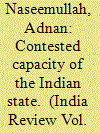

|
|
|
|
|
| Summary/Abstract |
State capacity is often seen as simply the resources and capabilities of state organizations to perform those functions that are seen as essential to monopolizing coercion, maintaining legitimacy, and providing key public and social goods. As such, it is often conceptualized as value-neutral and comparable across national contexts. By contrast, this article posits that in the Indian context, state capacity is a politically contested concept, because there is deep and enduring political conflict in India over the appropriate roles and related capabilities of state power. This conflict is grounded in disagreements between those who wish to use the state as a tool to transform society and those who see it as a means to preserve and protect social relations. As a result of this conflict, the state in India is not weak or captured but internally divided and thus disarticulated. This article demonstrates these dynamics through an examination of state intervention in the statist and post-liberalization political economy of India.
|
|
|
|
|
|
|
|
|
|
|
|
|
|
|
|
| 2 |
ID:
158840
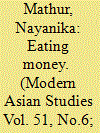

|
|
|
|
|
| Summary/Abstract |
This article studies corruption in India through an ethnographic elaboration of practices that are colloquially discussed as the ‘eating of money’ (paisa khana) in northern India. It examines both the discourse and practice of eating money in the specific context of the implementation of the National Rural Employment Guarantee Act, 2005 (NREGA). The article works through two central paradoxes that emerge in the study of corruption and the state. The first paradox relates to the corruption–transparency dyad. The ethnography presented shows clearly that the difficulties in the implementation of NREGA arose directly out of the transparency requirements of the statute, which were impeding the traditional eating of money. Instead of corruption being the villain it turns out that, in this particular context, it was its categorical Other—transparency—that was to blame. The second and related paradox emerges from an ethnographic examination of the processes and things through which development performance, corruption, and transparency are established and adjudged in the contemporary Indian state. Corrupt state practices and transparent state functioning are authoritatively proclaimed through an assessment of evidence—material proof in the form of paper—that is constructed by the Indian state itself. The push for transparency in India at the moment is not only leading to an excessive focus on the production of these paper truths but, more dangerously, is also deflecting attention away from what is described as the ‘real’ (asli) life of welfare programmes. Ultimately, this article contends that we need to eschew treating corruption as an explanatory trope for the failure of development in India. Instead of devising ever-more punitive auditing regimes to stem the leakages of the Indian state, this work suggests that we need a clearer understanding of what the state really is; how—and through which material substances—it functions and demonstrates evidence of its accomplishments.
|
|
|
|
|
|
|
|
|
|
|
|
|
|
|
|
| 3 |
ID:
179607
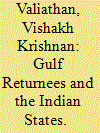

|
|
|
|
|
| Summary/Abstract |
Traditionally, India has been an agrarian economy; however, over the last thirty years, there has been a transition in the contribution to the Gross Domestic Product (GDP)- with service sector leading from the front. Moreover, Indian emigrants have been playing a massive role for decades in the country’s Growth and Social Development through remittances.
|
|
|
|
|
|
|
|
|
|
|
|
|
|
|
|
| 4 |
ID:
119046
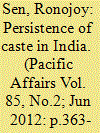

|
|
|
| 5 |
ID:
092208
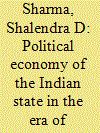

|
|
|
|
|
| Publication |
2009.
|
| Summary/Abstract |
The origins and nature of the post-Independence Indian state have been the subject of much research and debate among scholars and political activists. The state has been contradictorily and colourfully characterised as 'strong-weak', 'soft', 'overdeveloped', 'captured', a 'weak developmental state', and more recently as 'a divided Leviathan'-among other metaphors. It seems that India's democratic state has the ability to confound by displaying remarkable adaptability and resilience. Nowhere perhaps is this reflected more vividly than in India's dramatic abandonment, in 1991, of its decades-long commitment to a statist and inward-oriented economy model for an unprecedented and ambitious strategy of global economic integration.
|
|
|
|
|
|
|
|
|
|
|
|
|
|
|
|
| 6 |
ID:
146132
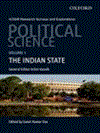

|
|
|
|
|
| Publication |
New Delhi, Oxford University Press, 2013.
|
| Description |
xxxix, 175p.hbk
|
| Series |
ICSSR Research Surveys and Explorations
|
| Contents |
058729 (Vol I) : Political Science:the Indian State
058730 (Vol. II) : Political Science: Indian Democracy
058731 (Vol. III) : Political Science: Indian Political Thought
058732 (Vol. IV) : Political Science: India engages the world
4 Vol. Set Price: Rs. 3995.00
|
| Standard Number |
9780198084945
|
|
|
|
|
|
|
|
|
|
|
|
Copies: C:1/I:0,R:0,Q:0
Circulation
| Accession# | Call# | Current Location | Status | Policy | Location |
| 058729 | 320.54/VAN 058729 | Main | On Shelf | General | |
|
|
|
|
| 7 |
ID:
102046
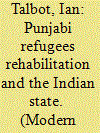

|
|
|
|
|
| Publication |
2011.
|
| Summary/Abstract |
Studies of Punjabi partition-related refugee resettlement have revealed a gap between official accounts and those provided by migrants. The former seek to legitimize the state by narrating its role in the transformation of helpless refugees into productive citizens. First hand accounts on the other hand frequently write the state out of the rehabilitation process. This paper seeks firstly to illustrate these processes at work by contrasting the narrative account contained in the Government of India publication, The Story of Rehabilitation, with interview material collected amongst former refugees. It then goes on to reveal the presence of state agency in cases of rehabilitation, despite refugee denial. Finally, it explores the refugee-state tensions arising from migrants' experience of local level bureaucratic and police services' corruption, which goes some way towards explaining the narrative dissonances.
|
|
|
|
|
|
|
|
|
|
|
|
|
|
|
|
|
|
|
|
|